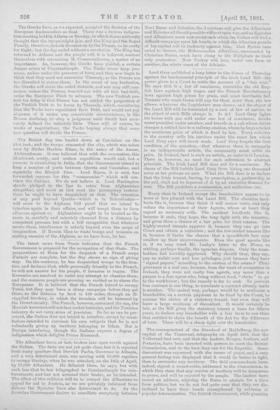The Greeks have, as we expected, accepted the decision of
the European Ambassadors as final. There was a furious indigna- tion meeting held in Athens on Sunday, in which it was evidently thought that the troops might join, and the King and the Royal Family, therefore, betook themselves to the Pillions, to be ready for flight; but the day ended without a revolution. The King has returned to Athens, and the people will, it is believed, content themselves with ostracising M. Coumouudouros, a matter Of no importance. As, however, the Greeks have yielded, a certain danger arises at Constantinople. The Turks never keep pro- mises, unless under the pressure of force, and they now begin to think that they need not surrender Thossaly, as the Powers are too disunited to coerce them. In the event of any hesitation, the Greeks will enter the ceded districts, and war may still com- mence, unless the Powers, wearied out with all this bad-faith, order the European Fleet to advance. The now Turkish pre- text for delay is that Greece has not settled the proportion of the Turkish Debt to be borne by Thessaly, which, considering that the Turks have repudiated their Debt, and would not pay sixpence of it under any conceivable circumstances, is like Brown declining to obey a judgment until Smith had accu- yetely defined the infinitely little. There will, of course, be weeks of negotiations, the Turks hoping always that some new question will divide the Powers.


































 Previous page
Previous page